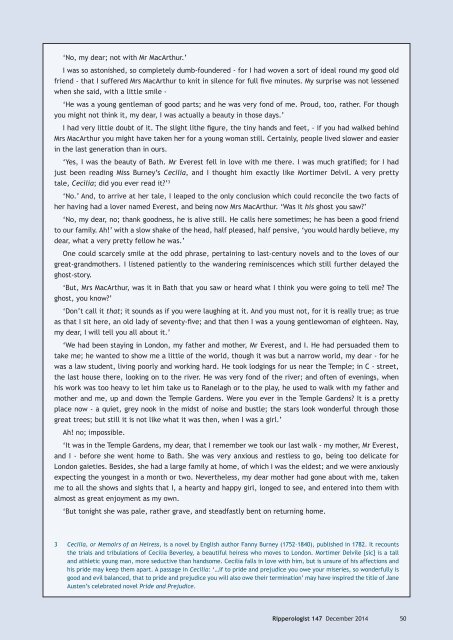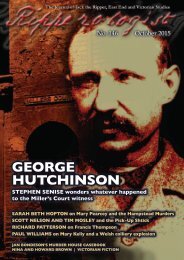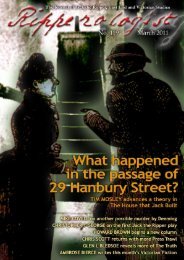Edmund Reid
nuhf574
nuhf574
Create successful ePaper yourself
Turn your PDF publications into a flip-book with our unique Google optimized e-Paper software.
‘No, my dear; not with Mr MacArthur.’<br />
I was so astonished, so completely dumb-foundered - for I had woven a sort of ideal round my good old<br />
friend - that I suffered Mrs MacArthur to knit in silence for full five minutes. My surprise was not lessened<br />
when she said, with a little smile -<br />
‘He was a young gentleman of good parts; and he was very fond of me. Proud, too, rather. For though<br />
you might not think it, my dear, I was actually a beauty in those days.’<br />
I had very little doubt of it. The slight lithe figure, the tiny hands and feet, - if you had walked behind<br />
Mrs MacArthur you might have taken her for a young woman still. Certainly, people lived slower and easier<br />
in the last generation than in ours.<br />
‘Yes, I was the beauty of Bath. Mr Everest fell in love with me there. I was much gratified; for I had<br />
just been reading Miss Burney’s Cecilia, and I thought him exactly like Mortimer Delvil. A very pretty<br />
tale, Cecilia; did you ever read it?’ 3<br />
‘No.’ And, to arrive at her tale, I leaped to the only conclusion which could reconcile the two facts of<br />
her having had a lover named Everest, and being now Mrs MacArthur. ‘Was it his ghost you saw?’<br />
‘No, my dear, no; thank goodness, he is alive still. He calls here sometimes; he has been a good friend<br />
to our family. Ah!’ with a slow shake of the head, half pleased, half pensive, ‘you would hardly believe, my<br />
dear, what a very pretty fellow he was.’<br />
One could scarcely smile at the odd phrase, pertaining to last-century novels and to the loves of our<br />
great-grandmothers. I listened patiently to the wandering reminiscences which still further delayed the<br />
ghost-story.<br />
‘But, Mrs MacArthur, was it in Bath that you saw or heard what I think you were going to tell me? The<br />
ghost, you know?’<br />
‘Don’t call it that; it sounds as if you were laughing at it. And you must not, for it is really true; as true<br />
as that I sit here, an old lady of seventy-five; and that then I was a young gentlewoman of eighteen. Nay,<br />
my dear, I will tell you all about it.’<br />
‘We had been staying in London, my father and mother, Mr Everest, and I. He had persuaded them to<br />
take me; he wanted to show me a little of the world, though it was but a narrow world, my dear - for he<br />
was a law student, living poorly and working hard. He took lodgings for us near the Temple; in C - street,<br />
the last house there, looking on to the river. He was very fond of the river; and often of evenings, when<br />
his work was too heavy to let him take us to Ranelagh or to the play, he used to walk with my father and<br />
mother and me, up and down the Temple Gardens. Were you ever in the Temple Gardens? It is a pretty<br />
place now - a quiet, grey nook in the midst of noise and bustle; the stars look wonderful through those<br />
great trees; but still it is not like what it was then, when I was a girl.’<br />
Ah! no; impossible.<br />
‘It was in the Temple Gardens, my dear, that I remember we took our last walk - my mother, Mr Everest,<br />
and I - before she went home to Bath. She was very anxious and restless to go, being too delicate for<br />
London gaieties. Besides, she had a large family at home, of which I was the eldest; and we were anxiously<br />
expecting the youngest in a month or two. Nevertheless, my dear mother had gone about with me, taken<br />
me to all the shows and sights that I, a hearty and happy girl, longed to see, and entered into them with<br />
almost as great enjoyment as my own.<br />
‘But tonight she was pale, rather grave, and steadfastly bent on returning home.<br />
3 Cecilia, or Memoirs of an Heiress, is a novel by English author Fanny Burney (1752–1840), published in 1782. It recounts<br />
the trials and tribulations of Cecilia Beverley, a beautiful heiress who moves to London. Mortimer Delvile [sic] is a tall<br />
and athletic young man, more seductive than handsome. Cecilia falls in love with him, but is unsure of his affections and<br />
his pride may keep them apart. A passage in Cecilia: ‘…if to pride and prejudice you owe your miseries, so wonderfully is<br />
good and evil balanced, that to pride and prejudice you will also owe their termination’ may have inspired the title of Jane<br />
Austen’s celebrated novel Pride and Prejudice.<br />
Ripperologist 147 December 2014 50




